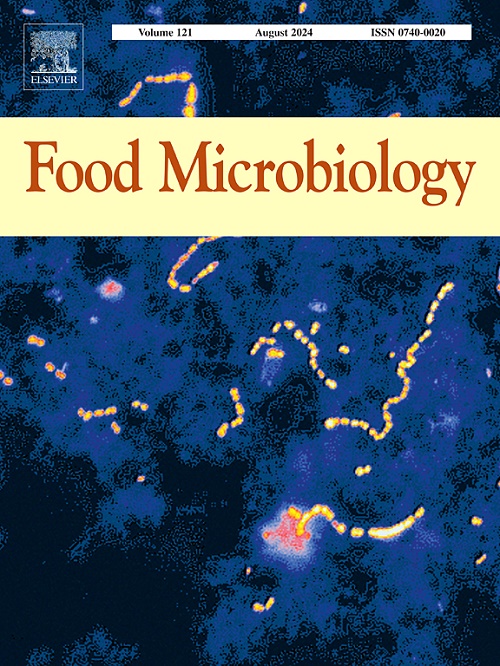RNA伴侣Hfq促进冷藏食品中小肠结肠炎耶尔森菌的生长
IF 4.5
1区 农林科学
Q1 BIOTECHNOLOGY & APPLIED MICROBIOLOGY
引用次数: 0
摘要
小肠结肠炎耶尔森菌是引起耶尔森菌病的主要食源性病原体,是一种重要的人畜共患感染。其独特的耐寒性使其成为冷链食品安全的潜在威胁。众所周知,rna结合蛋白Hfq参与了细菌应激调节,但其在小肠结肠炎菌耐寒性中的作用尚不清楚。通过基因敲除和基因互补,本研究发现,在低温条件下,hfq基因的缺失破坏了小肠结肠炎y菌的指数生长阶段,导致双相生长现象。此外,通过点突变体的构建,发现小肠结肠炎Y. Hfq耐寒性调控的关键氨基酸位点位于远端和近端表面。进一步研究发现,hfq缺失突变体的双相生长过程受到初始细菌浓度和外源脂肪酸的影响。RT-qPCR结果显示,Hfq调控可能影响支链氨基酸的合成,TCA循环相关基因在第二次指数生长期间显著上调。基于牛奶和肉类的研究表明,Hfq可以促进食物基质中小肠结肠炎耶氏菌的低温生长。我们的研究提供了证据,证明hfq依赖的能量代谢调节对小肠结肠炎菌的耐寒性至关重要。本研究强调Hfq在小肠结肠炎耐冷性调控中的重要性,并探讨其潜在调控机制。本文章由计算机程序翻译,如有差异,请以英文原文为准。

RNA chaperone Hfq promotes the growth of Yersinia enterocolitica in refrigerated foods
Yersinia enterocolitica is a major foodborne pathogen causing yersiniosis, a significant zoonotic infection. Its unique cold tolerance makes it a potential threat to the safety of cold chain food. The RNA-binding protein Hfq is known to be involved in bacterial stress regulation, but its role in the cold tolerance of Y. enterocolitica remains unclear. Based on gene knockout and complementation, this study revealed that deleting the hfq gene disrupted the exponential growth phase of Y. enterocolitica under low-temperature conditions, leading to a biphasic growth phenomenon. Additionally, through the construction of point mutants, it was found that the critical amino acid sites for cold-tolerance regulation of Hfq in Y. enterocolitica are located on the distal and proximal surfaces. Further studies found that the biphasic growth process of the hfq deletion mutant was affected by the initial bacterial concentration and exogenous fatty acids. RT-qPCR results showed that Hfq regulation may affect the synthesis of branched-chain amino acids, and TCA cycle-related genes were significantly up-regulated during the second exponential growth. Studies based on milk and meat have shown that Hfq can promote the low-temperature growth of Y. enterocolitica in the food matrix. Our study provides evidence that Hfq-dependent regulation of energy metabolism is critical for cold tolerance in Y. enterocolitica. This study highlights the importance of Hfq in regulating cold tolerance in Y. enterocolitica and discusses its potential regulatory mechanism.
求助全文
通过发布文献求助,成功后即可免费获取论文全文。
去求助
来源期刊

Food microbiology
工程技术-生物工程与应用微生物
CiteScore
11.30
自引率
3.80%
发文量
179
审稿时长
44 days
期刊介绍:
Food Microbiology publishes original research articles, short communications, review papers, letters, news items and book reviews dealing with all aspects of the microbiology of foods. The editors aim to publish manuscripts of the highest quality which are both relevant and applicable to the broad field covered by the journal. Studies must be novel, have a clear connection to food microbiology, and be of general interest to the international community of food microbiologists. The editors make every effort to ensure rapid and fair reviews, resulting in timely publication of accepted manuscripts.
 求助内容:
求助内容: 应助结果提醒方式:
应助结果提醒方式:


